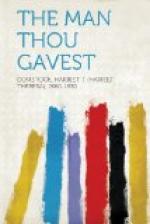Again the opposite side of the picture held her. “But suppose he did not want her—in that way? Then she, his friend—the one who, in all the world, loved him the best—would profit by it; she would be a wealthy woman, for her mother’s sake or”—the alternative staggered her—“she could let everything slip, everything and bear the consequences!”
At this point she turned to Truedale and asked pitifully again:
“Oh! why, why did you do this?”
There was no anger or rebellion in the words, but a pathos that caused the old man to close his eyes against the pleading in the uplifted face. It was the one thing he could not stand.
“Time will prove, child; time will prove. I could not make you understand; your mother might have—I could not. But time will show. Time is a strange revealer. All my life I have been working in darkness until—now! I should have trusted more—you must learn from me.
“There, do not keep the man waiting longer. I wonder—do not do it unless you want to, or think it right—but I wonder if you could kiss me good-bye?”
Lynda rose and, tear-blinded, bent over and kissed him—kissed him twice, once for her mother!—and she felt that he understood. She had never touched her lips to his before, and it seemed a strange ceremony.
An hour later Truedale called for Thomas and was wheeled to his bedroom and helped to bed.
“Perhaps,” he said to the man, “you had better put those drops on the stand. If I cannot sleep—” Thomas smiled and obeyed. There had been a time when he feared that small, dark bottle, but not now! He believed too sincerely in his master’s strength of character. Having the medicine near might, by suggestion, help calm the restlessness, but it had never been resorted to, so Thomas smiled as he turned away with a cheery:
“Very well, sir; but there will be no need, I hope.”
“Good-night, Thomas. Raise the shade, please. It’s a splendid night, isn’t it? If they should build on that rear lot I could not see the moon so well. I may decide to buy that property.”
When Thomas had gone and he was alone at last, Truedale heaved a heavy sigh. It seemed to relieve the restraint under which he had been labouring for weeks.
All his life the possibility of escape from his bondage had made the bondage less unendurable. It was like knowing of a secret passage from his prison house—an exit dark and attended by doubts and fears, but nevertheless a sure passage to freedom. It had seemed, in the past, a cowardly thing to avail himself of his knowledge—it was like going with his debts unpaid. But now, in the bright, moonlit room it no longer appeared so. He had finished his task, had ended the bungling, and had heard a clear call ringing with commendation and approval. There was nothing to hold him back!
Over in the cabinet by the window were a photograph and a few letters; Truedale turned toward them and wondered if Lynda, instead of his old friend McPherson, would find them? He wished he had spoken—but after all, he could not wait. He had definitely decided to take the journey! But he spoke softly as if to a Presence:




